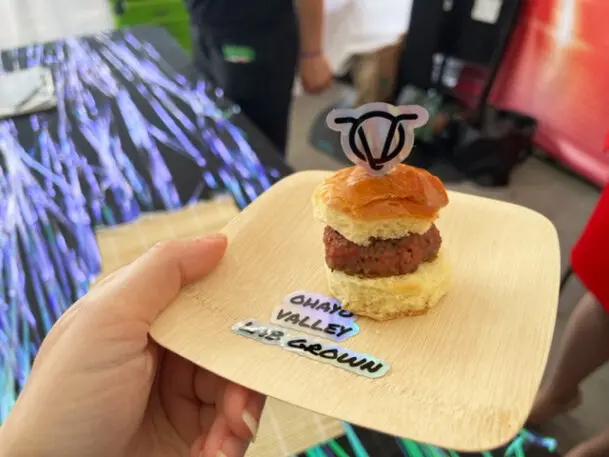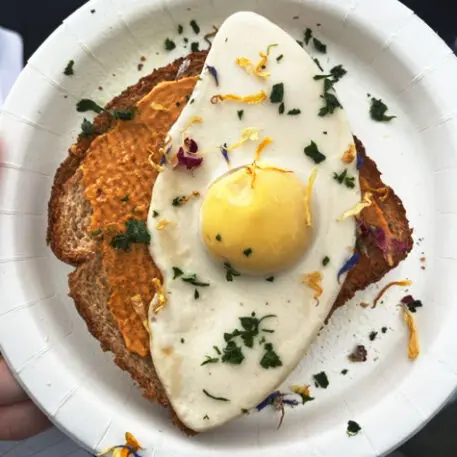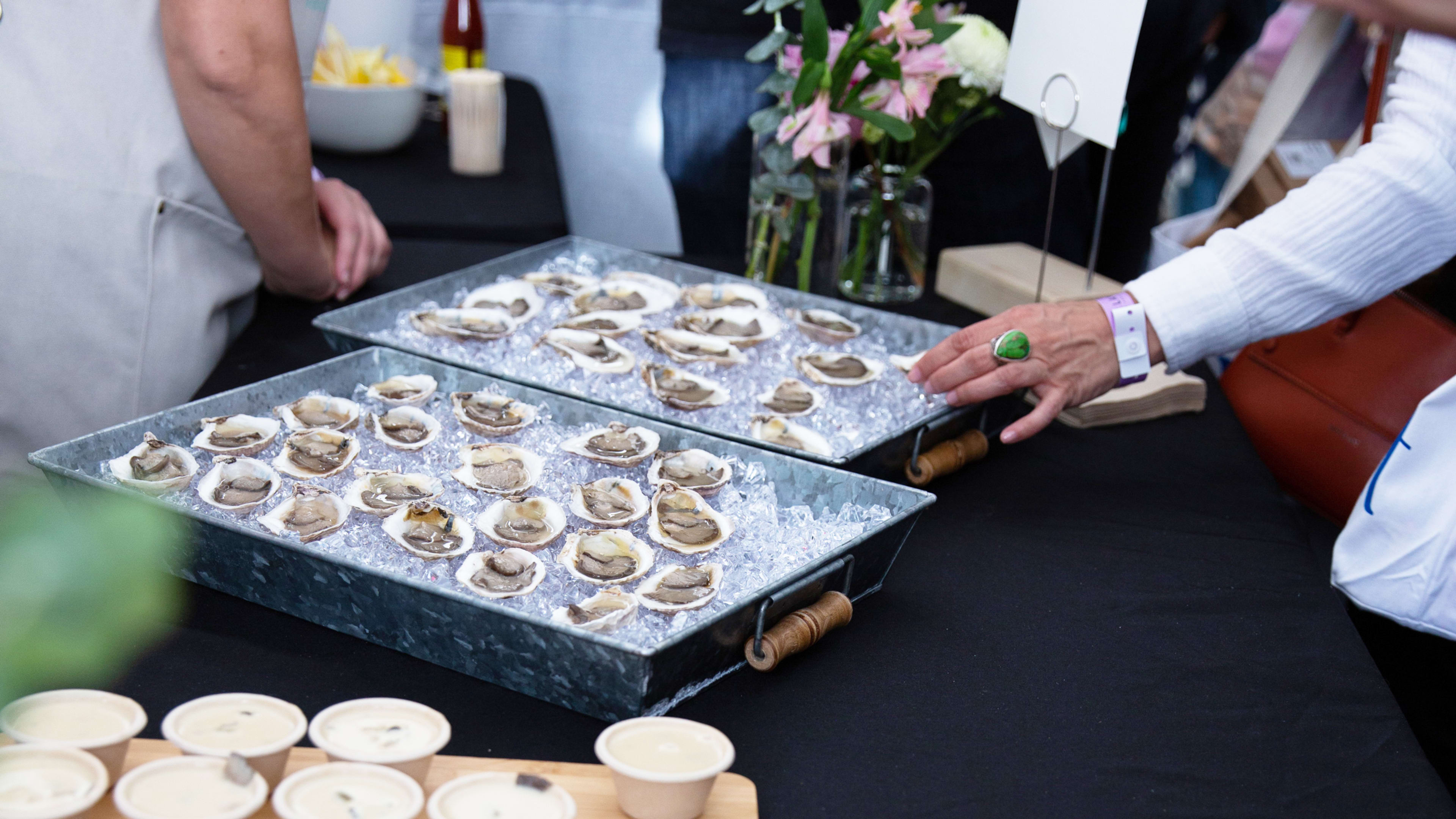Oysters, wagyu beef, and blue cheese sound like items that belong on the menu at a fine-dining steak house. They were also offerings at the recent Vegan Women Summit, a showcase of plant-based foods recently held in New York City.
The event (which was open to all genders and included companies founded by men) featured panels, book signings, and, most enticingly, tastings—from MeliBio’s vegan honey to MyBacon to more fungi alternatives from Nature’s Fynd. Event sponsors Impossible Foods and Tindle were there, so plant-based staples like chicken nuggets and breakfast sausages were also on offer.
It’s increasingly clear that the space for alternative meat and dairy is branching out and trying to replace every animal ingredient in our food system. The industry is growing rapidly, and it has the potential to top $162 billion globally by 2030 with impressive products like these five standouts—and many others.

Climax Foods cheeses
Climax Foods is already making a name for itself in the vegan cheese space, having recently partnered with Bel Group, the company behind brands like Babybel, Laughing Cow, and Boursin. Caroline Sorlin, Bel’s chief venture officer, told me that when she first tried Climax’s blue cheese, she couldn’t distinguish it from dairy—even the quality she’s “used to eating in France.”
I had high expectations, and Climax met them: Its blue cheese is creamy, with the same bright rivulets of mold running through it that you’d expect from a dairy version, sharp funk included.
It’s almost easier to say what it doesn’t have: no hints of coconut or artificial aftertaste, no grittiness or plastic-y texture. And that was true for all the Climax cheeses I tried: an in-oil feta that melted in my mouth and was the right level of salty; a soft goat cheese that had that familiar tang; and a buttery Brie that even had an earthy rind around its edge. Climax is focusing on artisanal cheeses, and its products are set to appear on some Michelin-rated menus in California and Baltimore soon, and eventually in grocery stores and specialty retailers later this year.

Pearlita Oysters
There’s a very tactile experience to eating a raw oyster: squeezing a slice of lemon over the plate, picking up the rough, textured shell, and tipping your head back to slurp it all down. Eating a plant-based oyster from Pearlita hits all those notes. At the event, the oysters, made of mushroom and seaweed, were even served in sterilized, recycled oyster shells (the company also serves them in ceramic shells). Pearlita returns discarded shells to oyster reef restoration projects.
The plant-based oyster certainly looks real, and though it has a distinct mushroom, umami flavor, it’s also pleasantly briny and fresh. Pearlita is working on cultivated oysters too, but in the meantime the mushrooms are a tasty alternative.

Impact Food Tuna Sashimi
Another raw seafood offering was the tuna sashimi from Impact Food, a plant-based sushi-grade tuna meant to go into poke bowls and sushi rolls. At the summit, the tuna was served with a soy-ginger marinade and with pieces of corn and edamame.
The tuna chunks are a bright beet red, and chewy but also firm. There’s a slightly fishy taste, though not in a bad way; that flavor comes from algae, which also gives the plant-based tuna omega-3s. Pea protein and vegetable juice are the other main ingredients. The texture here is key: soft and smooth but with a firm enough bite, something that’s hard to replicate with tofu, which tends to be spongy, or with vegetables, which are my go-to sushi fillings.
That’s a plight Impact Food’s founders understand: “People don’t want to go to a poke restaurant or a sushi restaurant and just order the avocado roll,” cofounder Kelly Pan told me. Impact’s tuna is already on the menu at Onigilly, a San Francisco-based (and not entirely vegan) Japanese restaurant.

Ohayo Valley Wagyu
Ohayo Valley is also working on cultivated meat, but starting with wagyu, the Japanese beef known for being soft, fatty, and flavorful. “I thought that creating a highly decadent, flavorful product would be an interesting challenge,” says Ohayo Valley founder Jess Krieger, who has been working on cultivated meat since 2010. “The holy grail of cultivated meat is steak, so we’re focused on developing a wagyu steak product.” At the summit, Ohayo Valley offered a wagyu burger, and I’ll admit I was nervous to try it; I haven’t eaten real meat in more than 15 years.
Ohayo Valley takes tissue biopsied from a cow and grows that tissue using cell culture technology, but its wagyu burger is also blended with plant-based protein and fat, which provides structure and mouthfeel, Krieger says. That fattiness comes through—the wagyu is almost buttery and melts in your mouth—as does the beef flavor, and without the strange aftertaste you might get with an all-soy burger.

Neggst fried egg
When Verónica García Arteaga, CEO of Berlin-based Neggst Foods, fried up my egg, she tipped a container of plant-based egg white and yolk that oozed into the pan. But in the future, you might be able to crack an actual shell to begin cooking a Neggst egg; the company is working on a biodegradable eggshell in which to encase its pea-protein and fava-bean-protein eggs. (Neggst has made prototypes but doesn’t yet have a machine to mass produce the shells.) The goal is to offer a vegan egg that has as many real applications as those from chickens: scrambled, fried, used in baking.
I tried a Neggst egg fried over a piece of toast, and the white was slightly thick and firm, with a mild flavor. The yolk, which includes sweet potato, wasn’t the same sort of gooey as the poached egg from Yo Egg, but was still creamy and rich. It wasn’t overly egg-y, but it was definitely reminiscent of the real thing, and almost had a mayonnaise-like flavor and consistency.
Recognize your brand’s excellence by applying to this year’s Brands That Matter Awards before the early-rate deadline, May 3.
